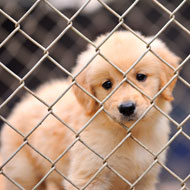George Eustice grilled on animal welfare

Going forward, the minister said he would like to strengthen the Pet Animals Act 1951 to make it clear that those selling pets online are required to have a licence.
Defra's minister of state George Eustice was subject to intense questioning last week as part of the Efra Committee's ongoing inquiry into animal welfare. MPs asked Mr Eustice to explain what action Defra is taking to deal with a number of key issues, including pet breeding and sales, puppy smuggling and sentencing for animal welfare offences.
During the meeting of the animal welfare sub-committee on 12 July, the minister revealed that the number of licences issued by local authorities for animal breeding establishments is in single figures in many cases - but in reality, many more people are breeding dogs.
Mr Eustice made it clear that, in general, he wants to see the current legislation strengthened to bring more breeders within the licensing system, rather than introducing new legislation.
Neil Parish MP, who chaired the meeting, raised concerns about Defra's lack of knowledge when it comes to how many puppy farms and unlicensed breeders there are.
"What I am worried about is that I don’t think Defra knows how many breeding establishments are out there and what is happening," he commented. "I don’t think they are monitoring what the local authorities are doing. I think you are unsighted; I really do. You think there is something going on out there and it is probably more than you know about. But what are you doing about it? That is the bit that I don’t see coming from your evidence, if I could be so blunt."
However, Mr Eustice said he did not accept the "caricature" that Defra is not doing anything or is unaware of the problem. "We have seen the evidence from a large number of local authorities, as I said earlier, about the number of people they have got within a licensing regime at the moment. That led me to conclude that there was inconsistency there and probably a lot of breeders who we would like to be within a system who were not at the moment."
MPs called for a ban on third party pet sales, a centralised list of licensed breeders and a requirement for all breeders to register for a licence. Mr Eustice expressed reluctance to consider a ban on third party sales as this could prove to be "almost unenforceable" and problematic when it comes to accidental litters.
There was a feeling among MPs, however, that a central database for commercial breeders and a legal requirement to include a registration number when selling pets online, would improve traceability and help to tackle the issues with internet pet sales and puppy smuggling from Eastern Europe. Mr Eustice responded by saying the department would look at this, though he pointed out that it is now an offence to sell a puppy without microchipping it, and changes being proposed by Defra would bring more breeders into the licensing regime.
Going forward, the minister said he would like to strengthen the Pet Animals Act 1951 to make it clear that those selling pets online are required to have a licence, even if they do not have a pet shop on the high street. A new condition for getting a licence is being considered, which would require businesses to give purchasers information on how to care for the pet they are buying. Another option put forward is to make the 2013 model conditions for pet vending licensing mandatory for local authorities.
Defra has also consulted on an amendment to the threshold for licensing, so that anyone breeding three or more litters a year is required to have a licence. A new system for licensing, which would exempt UKAS accredited dog breeders from the licensing requirements, is also being discussed.
Mr Eustice said the Ministry of Justice is giving active consideration to a review of the maximum sentences for animal welfare offences. Work is also being done to examine whether police records of animal abusers could be made more accessible to other organisations.



 The Veterinary Medicines Directorate (VMD) is inviting applications from veterinary students to attend a one-week extramural studies (EMS) placement in July 2026.
The Veterinary Medicines Directorate (VMD) is inviting applications from veterinary students to attend a one-week extramural studies (EMS) placement in July 2026.